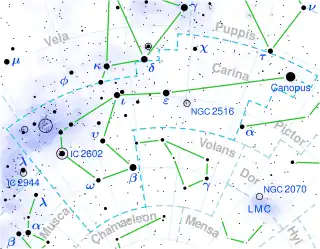 DENIS J081730.0−615520 Location of DENIS J081730.0−615520 in the constellation Carina | |
| Observation data Epoch J2000 Equinox J2000 | |
|---|---|
| Constellation | Carina |
| Right ascension | 08h 17m 29.99888s[1] |
| Declination | −61° 55′ 15.6586″[1] |
| Characteristics | |
| Spectral type | T6[2] |
| Apparent magnitude (J) | 13.613±0.024[2] |
| J−H color index | 0.087 ± 0.039[2] |
| J−K color index | 0.093 ± 0.049[2] |
| Astrometry | |
| Proper motion (μ) | RA: −156.451(507) mas/yr[1] Dec.: 1,099.366(503) mas/yr[1] |
| Parallax (π) | 191.8362 ± 0.4186 mas[1] |
| Distance | 17.00 ± 0.04 ly (5.21 ± 0.01 pc) |
| Details | |
| Radius | 0.94±0.16[3] RJup |
| Temperature | 1004±91[4] K |
| Rotation | 2.8±0.2 hours[5] |
| Age | 1[3] Gyr |
| Other designations | |
| Database references | |
| SIMBAD | data |
DENIS J081730.0−615520 (also known as 2MASS 08173001−6155158) is a T-type brown dwarf 17 light-years (5.2 parsecs) away in the constellation Carina. It was discovered by Etienne Artigau and his colleagues in April 2010.[2] The brown dwarf belongs to the T6 spectral class, with a photosphere temperature of about 1000 K.[4] It has a mass of about 15 MJ (Jupiter masses) or about 1.5% the mass of the Sun.
DENIS J081730.0-615520 is the fourth-nearest isolated T dwarf to the Sun (after UGPS J0722−0540, WISE 1741+2553, and WISE 1506+7027) and the eighth-nearest (also after Luhman 16B, ε Indi Bab and SCR 1845-6357B) if one takes into account T dwarfs in multiple star systems.[7] It is also the brightest T dwarf in the sky (in the J-band); it had been missed before due to its proximity to the galactic plane.[2]
References
- 1 2 3 4 5 Vallenari, A.; et al. (Gaia collaboration) (2023). "Gaia Data Release 3. Summary of the content and survey properties". Astronomy and Astrophysics. 674: A1. arXiv:2208.00211. Bibcode:2023A&A...674A...1G. doi:10.1051/0004-6361/202243940. S2CID 244398875. Gaia DR3 record for this source at VizieR.
- 1 2 3 4 5 6 Artigau, Etienne; Radigan, Jacqueline; Folkes, Stuart; et al. (2010). "DENIS J081730.0-615520: An overlooked mid-T dwarf in the solar neighborhood". The Astrophysical Journal Letters. 718 (1): L38–L42. arXiv:1006.3577. Bibcode:2010ApJ...718L..38A. doi:10.1088/2041-8205/718/1/L38. S2CID 118687449.
- 1 2 Vos, Johanna M.; Biller, Beth A.; Allers, Katelyn N.; Faherty, Jacqueline K.; Liu, Michael C.; Metchev, Stanimir; Eriksson, Simon; Manjavacas, Elena; Dupuy, Trent J.; Janson, Markus; Radigan-Hoffman, Jacqueline; Crossfield, Ian; Bonnefoy, Mickaël; Best, William M. J.; Homeier, Derek; Schlieder, Joshua E.; Brandner, Wolfgang; Henning, Thomas; Bonavita, Mariangela; Buenzli, Esther (2020), "Spitzer Variability Properties of Low-gravity L Dwarfs", The Astronomical Journal, 160 (1): 38, arXiv:2005.12854, Bibcode:2020AJ....160...38V, doi:10.3847/1538-3881/ab9642, S2CID 218889787
- 1 2 Kirkpatrick, J. Davy; Gelino, Christopher R.; et al. (March 2021). "The Field Substellar Mass Function Based on the Full-sky 20 pc Census of 525 L, T, and Y Dwarfs". The Astrophysical Journal Supplement Series. 253 (1): 7. arXiv:2011.11616. Bibcode:2021ApJS..253....7K. doi:10.3847/1538-4365/abd107. S2CID 227126954.
- ↑ Radigan, Jacqueline; Lafrenière, David; Jayawardhana, Ray (October 2014). "Strong Brightness Variations Signal Cloudy-to-clear Transition of Brown Dwarfs". The Astrophysical Journal. 793 (2): 75. arXiv:1404.3247. Bibcode:2014ApJ...793...75R. doi:10.1088/0004-637X/793/2/75. S2CID 118357522.
- ↑ Kirkpatrick, J. Davy; Cushing, Michael C.; Gelino, Christopher R.; Griffith, Roger L.; Skrutskie, Michael F.; Marsh, Kenneth A.; Wright, Edward L.; Mainzer, Amy K.; Eisenhardt, Peter R.; McLean, Ian S.; Thompson, Maggie A.; Bauer, James M.; Benford, Dominic J.; Bridge, Carrie R.; Lake, Sean E.; Petty, Sara M.; Stanford, Spencer Adam; Tsai, Chao-Wei; Bailey, Vanessa; Beichman, Charles A.; Bloom, Joshua S.; Bochanski, John J.; Burgasser, Adam J.; Capak, Peter L.; Cruz, Kelle L.; Hinz, Philip M.; Kartaltepe, Jeyhan S.; Knox, Russell P.; Manohar, Swarnima; Masters, Daniel; Morales-Calderon, Maria; Prato, Lisa A.; Rodigas, Timothy J.; Salvato, Mara; Schurr, Steven D.; Scoville, Nicholas Z.; Simcoe, Robert A.; Stapelfeldt, Karl R.; Stern, Daniel; Stock, Nathan D.; Vacca, William D. (2011). "The First Hundred Brown Dwarfs Discovered by the Wide-field Infrared Survey Explorer (WISE)". The Astrophysical Journal Supplement. 197 (2): 19. arXiv:1108.4677v1. Bibcode:2011ApJS..197...19K. doi:10.1088/0067-0049/197/2/19. S2CID 16850733.
- ↑ Reylé, Céline; Jardine, Kevin; Fouqué, Pascal; Caballero, Jose A.; Smart, Richard L.; Sozzetti, Alessandro (30 April 2021). "The 10 parsec sample in the Gaia era". Astronomy & Astrophysics. 650: A201. arXiv:2104.14972. Bibcode:2021A&A...650A.201R. doi:10.1051/0004-6361/202140985. S2CID 233476431. Data available at https://gruze.org/10pc/
External links
- Astronomers Announce First Clear Evidence of a Brown Dwarf – STScI news release STScI-1995-48 (November 29, 1995)